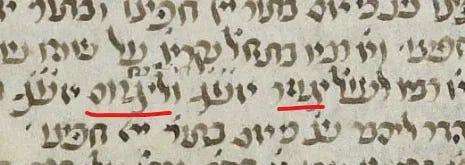Apologies for the slow posting this week. I am once again running up against some deadlines, so posting will be spotty for the next few weeks.
Here is something stuck in draft for a while.
The other day, in Avodah Zarah 19, Rava had a derasha:
וְאָמַר רָבָא: לְעוֹלָם לִיגְרֵיס אִינִישׁ, וְאַף עַל גַּב דִּמְשַׁכַּח, וְאַף עַל גַּב דְּלָא יָדַע מַאי קָאָמַר, שֶׁנֶּאֱמַר: ״גָּרְסָה נַפְשִׁי לְתַאֲבָה״, ״גָּרְסָה״ כְּתִיב וְלָא כְּתִיב ״טָחֲנָה״.
And Rava says with regard to Torah study: A person should always study [ligeris] and review even though he may afterward forget, and even though he does not understand what it is saying. As it is stated with regard to the study of Torah: “My soul breaks [garesa] for the longing that it has for Your ordinances at all times” (Psalms 119:20). It is written: “Breaks,” and it is not written: Grinds, demonstrating that the soul is satisfied with breaking apart material, on a basic level, even if it does not have the opportunity to grind and analyze it in greater depth.
This is an argument for simply the act of acquiring new material, even if he (a) he will rapidly lose it and (b) at the time, he does not have [full?] understanding of what he reads / hears. It is a pun on garas. But what should we make of the two af al pi cases, of even though he may forget and even though he does not understand?
Munich 95 uniquely has a slightly different version, א' רבא לעול' יגמר א'ע'ג' [[דמשכח]] וליגרוס א'ע'ג' דלא ידע.
So, the first action is יגמר and the other is וליגרוס. Yigmor perhaps has a greater though not absolute amount of actual understanding of the material — but he will end up forgetting it. Even so, it is valuable for some reason. And yigros perhaps has more of a sense of mere reading the plain words, with less of a level of understanding.
Additionally, Rava perhaps makes an additional derasha that does not appear in our printed gemaras. Uniquely, in Munich 95, this is followed by a derasha about the act of ligmor:
א' רבא ליגמר איני' והדר ליסבר שנ' כי אם בתור' יי חפצו·
That is, not only does he make the earlier derasha of study even though you won’t remember / you don’t understand, based on גָּרְסָה נַפְשִׁי. But now he makes a derasha that first you should ligmor == study to accumulate core knowledge, and only afterwards should you לִסְבֹּר, lisbor, contemplate and reason in order to understand the workings of the system and the underlying analysis. His prooftext for this is a verse that was cited earlier in this sugya for other purposes, namely Tehillim 1:2:
כִּ֤י אִ֥ם־בְּתוֹרַ֥ת ה חֶ֫פְצ֥וֹ וּֽבְתוֹרָת֥וֹ יֶהְגֶּ֗ה יוֹמָ֥ם וָלָֽיְלָה׃
rather, the teaching of the LORD is his delight,
and he studies that teaching day and night.
The idea behind the derasha is that what comes earlier in the verse is the earlier stage of learning. So:
First, torat Hashem cheftzo, he acquires the Torah of Hashem as a cheifetz, a concrete entity.
Only then, with torato, his own Torah or Hashem’s Torah, he is יֶהְגֶּ֗ה.
Higayon / יֶהְגֶּ֗ה is one of those strange words that can mean simply pronouncing — thus, Torat Hahegeh is the Modern Hebrew term for phonology; and can also mean deep contemplation, It is the deep contemplation meaning that is being tapped here.
As evidence that this is a real derasha, note that the same conclusion is drawn in other places, and from a different Biblical prooftext. Thus, in Shabbat 63a:
אָמַר רַב כָּהֲנָא: כַּד הֲוֵינָא בַּר תַּמְנֵי סְרֵי שְׁנִין וַהֲוָה גְּמִירְנָא לֵיהּ לְכוּלֵּיהּ תַּלְמוּדָא, וְלָא הֲוָה יָדַעְנָא דְּאֵין מִקְרָא יוֹצֵא מִידֵּי פְּשׁוּטוֹ עַד הַשְׁתָּא. מַאי קָא מַשְׁמַע לַן? דְּלִיגְמַר אִינִישׁ וַהֲדַר לִיסְבַּר.
Rav Kahana said about this: When I was eighteen years old and had already learned the entire Talmud, and yet I did not know that a verse does not depart from its literal meaning until now. The Gemara asks: What is Rav Kahana teaching us with that statement? The Gemara answers: He comes to teach that a person should first learn and then understand the rationale.
This is the Talmudic Narrator channeling a known expression.
Similarly, in Berachot 63b:
דָּבָר אַחֵר: ״הַסְכֵּת וּשְׁמַע יִשְׂרָאֵל״ — הַס, וְאַחַר כָּךְ כַּתֵּת. כִּדְרָבָא, דְּאָמַר רָבָא: לְעוֹלָם יִלְמוֹד אָדָם תּוֹרָה, וְאַחַר כָּךְ יֶהֱגֶה.
The Gemara offers yet another alternative explanation of this verse: “Keep silence [hasket] and hear, Israel”; first be silent [has] and listen and then study intensively in order to analyze [kattet] and clarify the details. This is in accordance with the opinion of Rava, as Rava said: One must always study Torah and gain expertise in it, and only then analyze and delve into it.
But, while the Talmudic Narrator attaches it to a new verse, he does not say that this is Rava’s source. Where Rava said it, and what his prooftext was, is left unknown. Now we know the primary sugya, and it is Rava’s second derasha as found in Munich 95.







That is a fascinating understanding of the Hebrew. Thanks so much!